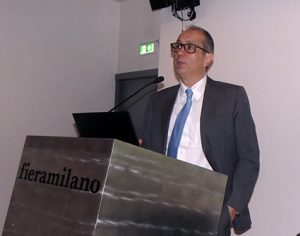
Nel corso dell’assemblea temuta il 9 maggio a TuttoFood, AssoBio ha presentato i dati Nielsen sull’andamento delle vendite biologiche nella GDO.
Da gennaio al 16 aprile 2017 le vendite complessive di food (alimentari + bevande + pet) sono aumentate nel canale del 3.7%, in ripresa rispetto allo 0.5% del 2016 (anche se il dato è un po’ drogato dall’inclusione del periodo pasquale).
Il valore delle vendite di prodotti biologici è invece aumentato del 19.7%, con un importo di 1,33 miliardi nei dodici mesi terminanti il 31 marzo 2017.
La crescita è sopra la media nei discount (+31.7%) e nelle superette (+23,5%); supermercati (vendite per 609 milioni, +19.8%) e ipermercati (vendite per 409 milioni, +16.7%) fanno la parte del leone.
Il biologico pesa il 3.4% delle vendite alimentari (pesava per il 2% nel 2013) e gli acquisti dei consumatori italiani nei supermercati sono più che triplicati dal 2009.
Rispetto allo stesso periodo di dodici mesi precedente, nella GDO le vendite di prodotti alimentari nel complesso sono aumentate di 419 milioni, quelle di prodotti biologici di 166: ciò significa che il biologico ha contribuito per il 40% alla crescita del mercato food.
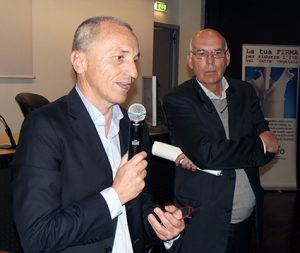
In aumento del 30% l’assortimento medio di prodotti bio nella GDO; la quota del bio sulla crescita assortimentale del totale alimentare è del 23%: in parole povere, su 100 nuovi prodotti inseriti a scaffale, 23 sono biologici. Il rilievo della categoria è tale che, ormai, nel 59% dei volantini sono presenti inserzioni sui prodotti biologici (il 21.6% dei quali è stato oggetto di iniziative promozionali).
Il peso dell’ortofrutta biologica confezionata a peso imposto è del 5.1% sulla propria categoria, quello della grocery 4.2%.
Tra i primi 15 prodotti per vendite in valore, è biologico il 52.8% di tutta la pasta integrale e speciale venduta in Italia, il 32.7% delle bevande vegetali sostitutive del latte, il 30.1% di confetture/marmellate, il 19% di legumi e cereali, il 14.5% delle uova, l’8.3% delle farine.
Il 75% degli acquisti si deve a 5 milioni di famiglie (su un totale di 20.5 milioni di acquirenti, l’83% delle famiglie italiane) che sono consumatrici abituali (tutte le settimane).
Il tasso di penetrazione sull’universo delle famiglie italiane è sopra la media in Area 1, 2 e, in misura minore, 3; è sotto media in Area 4.
Sopra media la frequenza di acquisti nelle famiglie di 3 e 4 componenti, di età tra i 35 e i 44 anni e tra i 45 e i 54 anni.
In relazione al reddito, è praticamente analoga la penetrazione tra famiglie con entrate sotto media, sopra media e alte (è minore solo nelle famiglie a reddito basso).
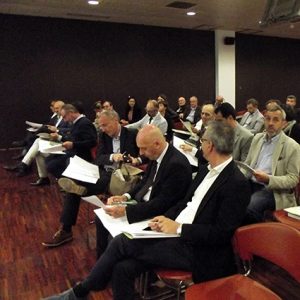
In conclusione, la crescita del biologico nei consumi degli italiani si consolida e il biologico è un fattore determinante nella crescita delle vendite dell’alimentare
Il principale driver di crescita è l’ampliamento dell’offerta assortimentale, ma cresce anche la domanda, con un forte incremento delle famiglie abituali (1 milione in più) nell’ultimo anno.
“Il mercato è in forte espansione in tutto il mondo – ha precisato con soddisfazione Roberto Zanoni, presidente di AssoBio – Il consumatore è sempre più attento alla qualità complessiva dei prodotti che acquista, ed è sempre meno interessato a prodotti che, apparentemente economici, hanno un pesante impatto sull’ecosistema. I dati ufficiali dell’istituto di ricerca del ministero per l’ambiente dicono che il 63,9% delle acque superficiali e il 31,7% di quelle sotterranee sono contaminate da pesticidi. Basta far quattro conti sui dati ufficiali ISTAT: per ogni italiano l’agricoltura convenzionale immette nell’ambiente oltre 70 kg di insetticidi, anticrittogamici, diserbanti e fertilizzanti chimici. È sempre più evidente che il pianeta non può sostenere più a lungo una produzione di questo tenore. Per non dire dei grandi temi dell’abuso di antibiotici e delle densità e delle condizioni generali degli allevamenti, e per non parlare di OGM e additivi alimentari. È ovvio che un consumatore consapevole cerchi un’alternativa a questo modo di produrre, diventando così egli stesso un protagonista della conversione a un’economia sostenibile”
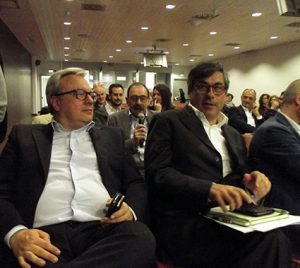
“È un controsenso che le nostre imprese, che assieme a ottimi alimenti producono beni pubblici come la tutela dell’ambiente e della biodiversità, il benessere animale e lo sviluppo rurale, debbano sopportare costi per certificare che non inquinano, mentre chi inquina non paga nulla e scarica i costi sulla collettività. Non chiediamo contributi, ma che esca finalmente dai cassetti nei quali da oltre un anno è stato accuratamente riposto, il Piano strategico nazionale per lo sviluppo del sistema biologico nazionale, a cui abbiamo cominciato a lavorare sin da EXPO e che è stato approvato nel marzo 2016 dalla conferenza Stato Regioni. Il piano prevede la promozione di politiche di filiera, per ricerca, innovazione e formazione, strumenti di comunicazione istituzionale e semplificazione normativa. Il tasso di crescita che da anni registrano le superfici agricole (siamo già al 12% del totale nazionale), il numero di aziende agricole e di trasformazione, e l’aumento della domanda da parte dei consumatori italiani ed esteri dimostrano che l’agroalimentare biologico è l’unica alternativa credibile a un modo di produrre non più sostenibile e non può, quindi, esser lasciato senza strumenti fondamentali per meglio svilupparsi e consolidarsi”.
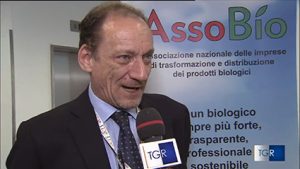
Italian organic sales post new record
During the assembly held on May 9 in Milan at TuttoFood international exhibition, AssoBio presented Nielsen data on the trend of organic food sales in Italian supermarkets.
In this sales channel, from January to April 16, 2017, total food sales (food + drinks + pet food) increased by 3.7%, up from 0.5% in 2016 (AssoBio warns that the figure may be somewhat doped by the inclusion of the Easter period).
The value of sales of organic products in supermarkets, conversely, increased by 19.7%, amounting to 1.33 billion EUR in the twelve months ending March 31, 2017.
Growth was above the average in discounts (+ 31.7%) and in superettes (mini-marts, + 23.5%); supermarkets (sales of 609 million EUR, + 19.8%) and hypermarkets (sales of 409 million EUR, + 16.7%) make the lion’s share.
The share of organic food on the total food sales is 3.4 percent (it was 2 percent in 2013) and Italian consumer purchases in supermarkets have more than tripled since 2009.
Compared to the same period of the previous twelve months, overall food sales in supermarkets increased by 419 million EUR, 166 of which covered by organic products, which means that organic food contributed 40 percent to the growth of the total food markets in Italy.
The average organic product range in supermarkets grew 30%; share of organic products of the total food assortment growth is 23%: in a word, 23 out of 100 new products placed on a shelf are organic. The category is such that in 59% of supermarket promotional leaflets you can find the advertisement of some organic products (21.6% of which in the last twelve months were under promotional initiatives).
The weight of organic packaged fruit is 5.1% on its category, that of grocery 4.2%.
Among the 15 top selling products, 52.8% of whole and special pasta sold in Italy is organic, as well as 32.7% of non-dairy drinks, 30.1% of jams, 19% of pulses and grains, 14.5% of eggs, and 8.3% of flour.
75% of purchases in value are made up by 5 million households (out of a total of 20.5 million buyers, 83% of Italian households) who are habitual consumers (every week).
The penetration rate on the universe of Italian families is above the average in Northern Italy and, in a lesser extent, in central regions; in Southern Italy is below average.
Above average is the frequency of purchases in families of 3 and 4 members and between the ages of 35 to 44 and 45 to 54.
In relation to income, the penetration is practically the same in households with under average, medium and high income, while it is lower in low-income households.
In conclusion, organic growth in Italian consumption is consolidating year after year and organic is gaining a role as a determining factor in the growth of total food sales.
The main driver of growth is the widening of the range, but demand is also growing, with a strong increase in households choosing organic products (1 million more in the last year).
AssoBio focused its conference on supermarkets channel, but in Italy there is a strong specialized organic shop channel too.
Organic shops are about 1,250 all over Italy, with a stronger concentration in Northern and Central regions), about 350 are supermarket-sized with a range of around 4,500 food items. AssoBio estimates 2016 sales of 890 million EUR in the specialized channel; food service is worth around 350 million EUR (the daily use of organic products in schoolmeals is compulsory in Italy), while other channels (direct sales, farmer’s market, box schemes, on-line, small non specialized food shops) score 380 million EUR.
“The market is booming all over the world,” said Roberto Zanoni, President of AssoBio. “The consumer is increasingly aware of the overall quality of the products he buys and is less and less interested in products that, even if apparently cheap, have a heavy environmental impact. The Ministry of Environment’s official findings say that 63.9% of surface water and 31.7% of groundwater are to some extent contaminated by pesticides. All you have to do is count on official Italian Statistics data: for every Italian, conventional farming pumps more than 70 kg of insecticides, fungicidals, herbicides and chemical fertilizers in the environment. It is increasingly evident that the planet cannot sustain a production of this tenor longer. Not to mention the big issues of antibiotic abuse and the density and general conditions of mainstream breeding farms, not to mention GMOs and food additives. It is obvious that an informed consumer is looking for an alternative to this way of producing, thus becoming a protagonist of the conversion to a sustainable economy ”
“It is a contradiction that our businesses, which together with good foods produce public goods such as the protection of the environment and biodiversity, animal welfare and rural development, have to bear costs to certify that they do not pollute, while polluters pay nothing and offload the costs to the community. We do not ask for contributions, but we ask for the National Strategic Plan for the Development of the Organic System finally comes out of the drawers in which it has been carefully housed for more than a year. We started to discuss on it in EXPO Milan, it was officially approved in March 2016 by the Conference of State and Regional governments, but nothing’s has happened yet. The plan provides for the promotion of supply chain policies, research, innovation and training, institutional communication tools and regulatory simplification. The growth rate of organic agricultural surface (which is already 12% of the total national agricultural area), the growing number of farms and processing companies (+8% last yerar), and the increase in demand by Italian and foreign consumers show that organic food is the only credible alternative to a way of producing no longer sustainable and cannot therefore be left without basic tools to better develop and consolidate”.

Assobio was founded in 2006 by 11 Italian companies involved in processing and distribution of organic products. The goal was to represent the organic business community within the interprofessional organizations, to be the reference point for public authorities, to safeguard the integrity of the industry and to support the development of the organic market.
As of March 2017 members are 81 (and in 11 years none has left the association), of different size and product sectors, virtually all the pioneers of the Italian organic industry, but also companies which more recently started to deal with organics; our members’ overall organic sales is around 1.5 billion EUR.
AssoBio is independent from mainstream business organizations and from any control body; it is member of the Italian organic interprofessional federation Federbio, of IFOAM EU and IFOAM International Organics.
the association is requested to take part in Italian parliamentary hearings; after consultation with our members it expresses the industry’s position on proposed legislation and regulations.
AssoBio promoted FederBio’s protocol for the improvement of controls on organic fruit and vegetables, the IT FederBio Integrity Platform for tracking transactions of cereal, protein and oil crops in collaboration with Accredia, the Italian national accreditation body, as well as the IT platform for traceability of virgin-olive oils which will start its operation in 2017.
The association is part of the emergency unit of FederBio, of the Accredia sectorial accreditation committee on quality food production, collaborate with SANA international organic exhibition (performing scouting and validating the list of foreign buyers to be hosted in incoming projects), with ICE-Italian Trade Agency and Nomisma economic research institute. It is partner in projects for promotion and internationalization of organic businesses and, based on an agreement with Nielsen, is able to provide regular analysis and information on organic market trends.A newsletter only available to members informs them on market and regulatory issues and alerts on critical concerns.
